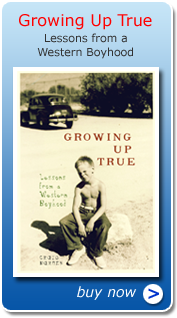When I grew up on the plains of eastern Colorado, I walked across wheat fields to a little three-room country school. I slept on summer nights under the cottonwoods, raised chickens and sheep and some days rode horses like the wind flying across the prairies. In school, we had three classes in the same room, but I learned what we thought were the values of America.
I learned that we had saved the world from the aggressions of Hitler and Japanese warlords, that we, as a principle, resisted imperialism and contained communism. That we had fostered the United Nations, were champions of international law and descendants of a new order for the ages, a country in which law was above the king. In that little red brick school house we learned of George Washington's self restraint, Abraham Lincoln's essential kindness, Woodrow Wilson's search for the rule of international law, the generosity of Truman's Marshall Plan.
I learned that when World War II was over we supported the Nüremberg principles and incorporated them into treaties outlawing the practice of killing civilians indiscriminately in war. I learned that people were not to be judged by the color of their skins or their religions, or condemned for their political associations and that the great gift of the American republic was to hold high the flag of equal dignity. We did not blame the German people for the crimes of Hitler, nor the Japanese as a people for the crimes of Hirohito. We fed the hungry, we granted courts of law to the wicked, even to war criminals.
When I served in the US Army infantry in the 1960s I learned that we would oppose illegal aggression but never become aggressors ourselves. I learned that we depended upon the rationality of leaders in the Soviet Union and that they depended upon us for rationality not to commit mutual suicide. I learned that the United States would never be the first to use nuclear weapons.
On January 28, 2003, in one speech, George W. Bush threw away and rejected all this that I had learned. He scorned the rationality of his opponents, scorned the diplomatic process, scorned containment, condemned deterrence, declared the right of pre-emptive aggressive war, implied a willingness to use nuclear weapons first, and authored a new doctrine of American imperialism for the Middle East. He dismissed 50-year-old treaties banning aggression, stating that we would attack when we wished and explicitly rejected the legal pre-requirement that the threat to us be "imminent," knowingly mocking international law.
He narrowed his eyes and stated his intention to kill terrorist suspects, wherever he finds them, upon suspicion, without trial. He endorsed guilt by association as the test of criminality, a willingness to kill people for their association with Al Qaeda, without actual proof of their intention or action. He will track down and kill his targets, undoubtedly based upon the color of their skin and their religion, wherever in the world he might find them and whenever he might suspect them.
The small band of ideologues who seized the presidency in Florida two years ago have now demonstrated with what mind they were willing to use shouting crowds, mob intimidation and force. This State of the Union speech was a product of the same mind. Carefully inserted under the superficial heading of Iraq and terror was artfully embedded an agenda which has been dogging the moderate Republican Party ever since World War II.
When Bush used the word and explicitly renounced "containment" he rejected the centrist foreign policies of Truman, Eisenhower, Kennedy, Nixon, and Reagan. When he used the word and rejected "rationality" he scorned the core principle of deterrence which has guided every president in the nuclear age. When he looked the world in the eye and said he would not abide by the United Nations, he rejected the 50-year old foundation of world order. When he said he would not hesitate to cause the deaths of innocent civilians in Iraq, he endorsed the idea of collective responsibility, a violation of the Nüremberg principles. When he said that he would track down and kill people whom he imagined were terrorists, without trial, without evidence or proof, he rejected the foundation of American democracy that we are a nation of law.
It is as if, in Florida two years ago, the NRA had seized the government and that suspicion, malice and bravado had become our flag. This State of the Union was the bold declaration of the extreme conservative victory they have sought for a generation.
January 28, 2003, is therefore apt to be remembered as a watershed day in American history, a day of infamy reminiscent of Pearl Harbor, December 7, 1941. This time the infamy is the conquest of bravado and guns over restraint and decency, imperialism and militarism over the rule of law, the extreme right over the moderate center. This speech was not so much a declaration of war against Iraq as the announcement of the long-sought victory over what the president scornfully in is speech called "process" and we call democracy. This passionate regard for the use of force rather than process is what drove the explicit rejection in the speech of all those code words, all those "soft" policies of the past. This was intended to be the Krystalnacht of post-war American liberalism and the uncowed declaration of American preeminence in the world. Call it the Grande Reversal of 2003 and prepare for the war that it launches, not only in Iraq, but in the hearts and minds of broad middle America, those who went to ordinary schools, those who are not elite, those who need democracy to survive.
